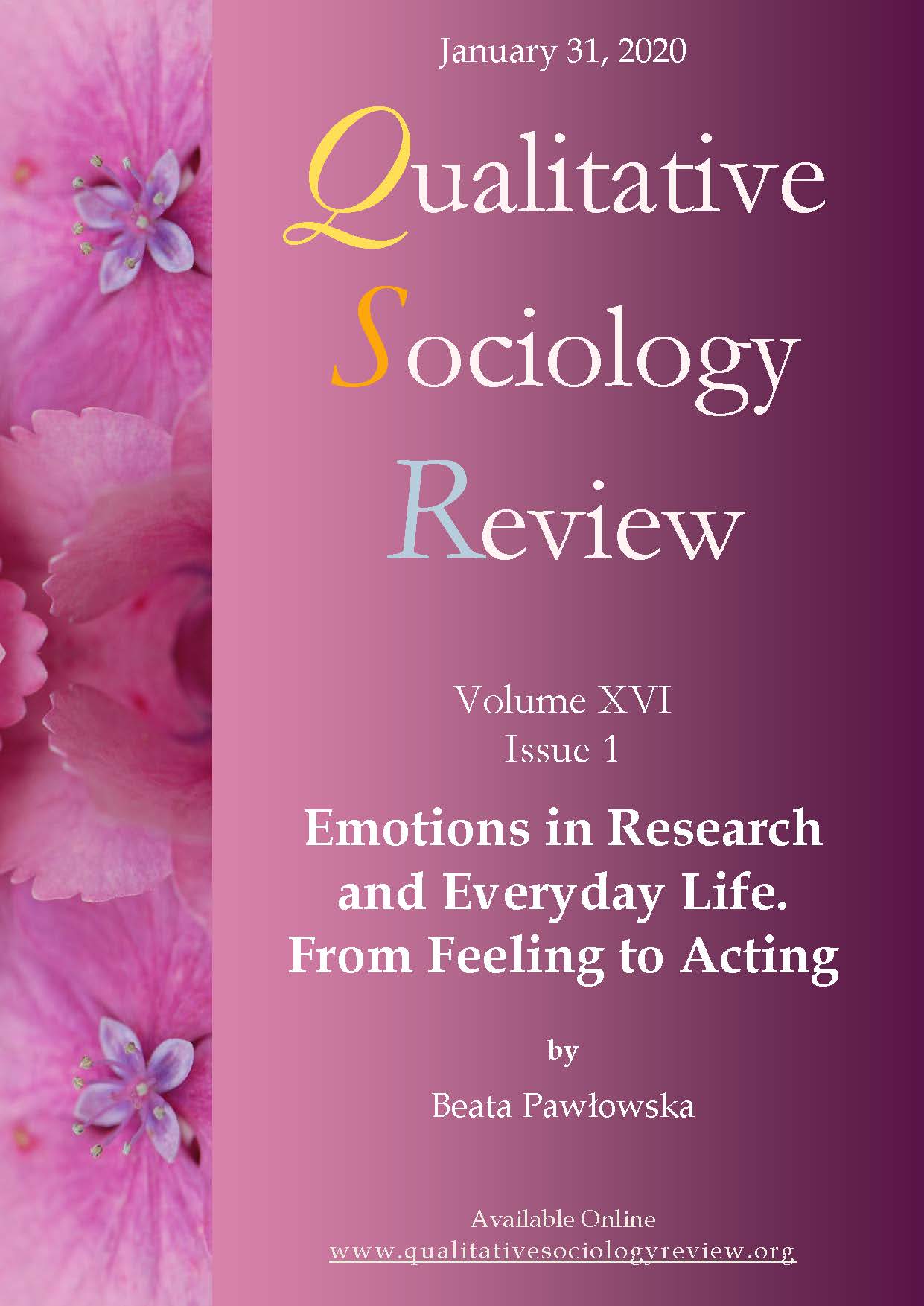Narrating Emotions: Towards Deeper Understanding
DOI:
https://doi.org/10.18778/1733-8077.16.1.02Keywords:
Narrative, Understanding, Empirical Reality, Social Encounter, Hermeneutics, Engagement, Empathy, EmotionAbstract
Qualitative research aims at unwrapping the ordinary and the exceptional in order to bring us closer to a complete description and interpretation of life. People’s narratives are particularly effective in revealing deeper dimensions of experience and of meaning. Narratives always need to be read against the background of the empirical reality in which they are embedded. Most of the narratives referred to in this article are situated against the empirical reality of South Africa as a society in transition, still marred by inequality and inequity. One narrative, from a project conducted in the Czech Republic, shares some contextual characteristics with the South African examples—the Czech Republic is also a society in transition, previously employing institutional violence to suppress political dissent.
An important aspect when dealing with intense political and social transformation is the presence of highly charged feelings and emotions. As part of the contextualization for this article I briefly argue that the South African Truth and Reconciliation Commission (1996-1998) in many ways did the groundwork for a new appreciation of the sharing of emotional accounts and revelations pertaining to atrocities, injustices, and suffering. This Commission’s work prepared the way for recognition of the potential of such sharing to create a better understanding of the experience of life in a deeply divided context.
In the article, I argue for the establishment of a social encounter—a concept frequently used in the micro-sociological writings of Randall Collins—between researcher and research participant in an attempt to come to deeper levels of understanding. During episodes of emotional sharing of experiences and feelings a research participant often reveals deeper levels of social interaction—these revelations have the potential to open the way for a hermeneutical process towards understanding. Dramatic recall can lead to reconstructing a story that contains all the elements of what was originally heard, seen, and felt.
The article uses five examples of narratives containing moments of high levels of emotion—each example opening the way for better understanding of the experiences of the research participants.
Downloads
References
Atkinson, Paul and Sara Delamont. 2009. “Rescuing Narratives from Qualitative Research.” Pp. 309-318 in Life Story Research, vol. I, edited by Barbara Harrison. London: Sage.
Google Scholar
Bazeley, Pat. 2013. Qualitative Data Analysis: Practical Strategies. London: Sage.
Google Scholar
Bleicher, Josef. 1982. The Hermeneutic Imagination. London: Routledge & Kegan Paul.
Google Scholar
Bourdieu, Pierre. 1989. “Social Space and Symbolic Power.” Sociological Theory 7(1):14-25.
Google Scholar
DOI: https://doi.org/10.2307/202060
Bourdieu, Pierre. 1990. The Logic of Practice. Cambridge: Polity Press.
Google Scholar
DOI: https://doi.org/10.1515/9781503621749
Bourdieu, Pierre and Loïc Wacquant. 1992. An Invitation to Reflexive Sociology. Cambridge: Polity Press.
Google Scholar
Coetzee, Jan K. and Asta Rau. 2017. “Between Enslavement and Liberation: Narratives of Belonging from Two Farm Workers in Rural South Africa.” Qualitative Sociology Review 13(1):10-31.
Google Scholar
DOI: https://doi.org/10.18778/1733-8077.13.1.02
Coetzee, Jan K., Lynda Gilfillan, and Otakar Hulec. 2002. Fallen Walls: Voices from the Cells that Held Mandela and Havel. Prague: Lidové Noviny.
Google Scholar
Collins, Randall. 2004. Interaction Ritual Chains. Princeton: Princeton University Press.
Google Scholar
DOI: https://doi.org/10.1515/9781400851744
Creswell, John W. 2013. Qualitative Inquiry & Research Design: Choosing among Five Approaches. London: Sage.
Google Scholar
Denzin, Norman K. and Yvonna S. Lincoln. 2011. The Sage Handbook of Qualitative Research. London: Sage.
Google Scholar
Inglis, David. 2012. An Invitation to Social Theory. Cambridge: Polity Press.
Google Scholar
Kok, Michael, Jan K. Coetzee, and Florian Elliker. 2017. “Overcoming the Divide: An Interpretive Exploration of Young Black South Africans’ Lived Experiences of Upward Mobility in Central South Africa.” Qualitative Sociology Review 13(1):56-73.
Google Scholar
DOI: https://doi.org/10.18778/1733-8077.13.1.04
Masenya, Dimakatso Veronica. 2015. Women’s Narratives of Everyday Precarity in the Mangaung Township (Bloemfontein, South Africa). Master’s Dissertation in The Narrative Study of Lives. Bloemfontein: University of the Free State.
Google Scholar
Mbelekani, Yvonne N., Amanda Young-Hauser, and Jan K. Coetzee. 2017. “The Sangoma or the Health-Care Centre? Health-Seeking Practices of Women Living in the Mangaung Township (Bloemfontein, South Africa).” Qualitative Sociology Review 13(1):210-227.
Google Scholar
DOI: https://doi.org/10.18778/1733-8077.13.1.12
Outhwaite, William. 1987. New Philosophies of Social Science. London: Macmillan.
Google Scholar
DOI: https://doi.org/10.1007/978-1-349-18946-5
Plummer, Ken. 2001. Documents of Life 2. An Invitation to Critical Humanism. London: Sage.
Google Scholar
DOI: https://doi.org/10.4135/9781849208888
Popova, Yanna B. 2015. Stories, Meaning, and Experience: Narrativity and Enaction. New York: Routledge.
Google Scholar
DOI: https://doi.org/10.4324/9781315880488
South African History Online. 2017. Truth and Reconciliation Commission. Retrieved October 03, 2018 ( https://www.sa-histo-ry.org.za/topic/truth-and-reconciliation-commission-trc )
Google Scholar
Stanley, Liz. 2013. Documents of Life Revisited: Narrative and Biographical Methodology for a 21st Century Critical Humanism. Surrey: Ashgate.
Google Scholar
Van Maanen, John. 1988. Tales of the Field: On Writing Ethnography. Chicago: University of Chicago Press.
Google Scholar
Wacquant, Loïc. 1989. “Toward a Reflexive Sociology: A Workshop with Pierre Bourdieu.” Sociological Theory 7(1):26-63.
Google Scholar
DOI: https://doi.org/10.2307/202061
Wetherell, Margaret. 2012. Affect and Emotion: A New Social Science Understanding. London: Sage.
Google Scholar
DOI: https://doi.org/10.4135/9781446250945
Downloads
Published
How to Cite
Issue
Section
License

This work is licensed under a Creative Commons Attribution-NonCommercial-NoDerivatives 4.0 International License.











